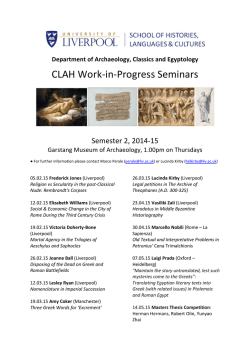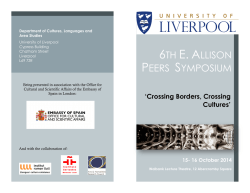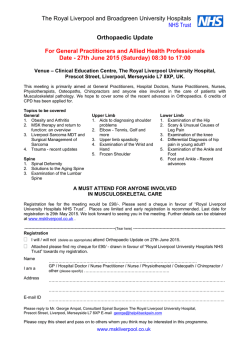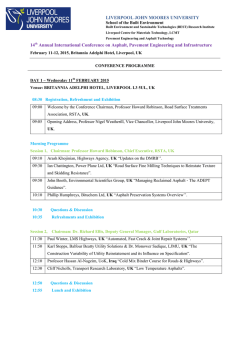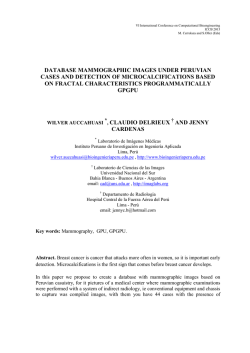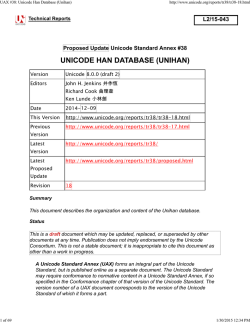
¿Cómo se dice? ¿Qué significa? ¿Qué quiere decir? - Sra.Irias - Main
By Amy W. Pento, Liverpool High School, Liverpool, NY 13090 ¿Cómo se dice? ¿Qué significa? ¿Qué quiere decir? Paquete de Diccionario 1 By Amy W. Pento, Liverpool High School, Liverpool, NY 13090 2 ¡Nombra esa canción! Below are popular song lyrics. They have been copied into a popular tranlation site and translated from English to Spanish and then back to English. Can you Nombra esa canción? A. Hoping of the foreigners Above and under the boulevard Its search of the shades At night Lampposts, people Living hardly to find the emotion hiding, somewhere at night B. She' s obtained both hands In its pocket and she will not watch Won' to him; watched of t you in Her hide with love Pocket of In his She obtained I pull ahead around his finger around you. C. I know a place Where the Hot grass is really greener, dunked and wild It must have something in the Geneva water and juice that underneath suck Putting the palms (exhausted) the Rómpase boys the necks trying to crawl a small glance of informer (in us). D. In New York, concrete Forest of where the dreams become, There' s nothing that you cannot do, Now you are in New York, These streets will make him the sensation release, the lights will inspire to him leaves, It here for New York, New York, New York. E. In Spanish I hear that the bells of Jerusalem that the Roman choirs of sound of a cavalry are singing are my mirror my sword and armor to my misionarios in a foreign field for some reason I can' t explains to me knows that San Pedro never an honest word will call my name But that one was when I governed the world. F. It leaves my door open as soon as a crack (Tómeme please far from here) ' They cause to me feel so as sleepless (they take me please far from here) Because it makes the tire of I count ewes (Tómeme please far from here) When I' m far tired also to lower slept. G. It fills my cup, congratulations. Watches its dance, as soon as quítelo Pintemos the city, we' it closed ll it We burn the roof, and we will make then it again We do it, we do it, we do it, we do it they do and them they do and them, we live he stops above and hágalo and hágalo and hágalo do, it do, it Do it, do it, do it By Amy W. Pento, Liverpool High School, Liverpool, NY 13090 3 Translation Sites are Ineffective I. Original Article in Spanish Britney Spears y esposo se presentan en entrevista en TV - Un azafato exasperado que el lunes se escapó del avión accionando el tobogán de emergencia tras un altercado con un pasajero fue inculpado el martes en Nueva York, anunció la fiscalía, aunque para muchos es un héroe. Steven Slater, de 38 años, se convirtió instantáneamente en famoso -incluso en héroe, para algunos admiradores en redes de internet como Facebook- cuando los medios de Estados Unidos relataron su controvertido gesto de rebeldía. El azafato fue inculpado formalmente por la jueza Mary O'Donoghue en un tribunal de Queens, por cargos que incluyen haber puesto en peligro a los pasajeros, por los cuales es pasible de hasta siete años de cárcel. Según la fiscalía, Slater deberá pagar una fianza de 2.500 dólares para no permanecer detenido y comparecerá nuevamente ante el mismo tribunal el 7 de setiembre próximo. El incidente se produjo el lunes, poco después de que un Embraer de la aerolínea Jet Blue aterrizase en el aeropuerto Kennedy procedente de Pittsburgh, dijo una fuente policial de la Autoridad Portuaria de la ciudad. Uno de los pasajeros se negó a permanecer sentado y comenzó a recuperar su equipaje de mano, desoyendo las instrucciones del azafato, con quien se produjo luego un altercado. Slater descargó entonces dos décadas de frustración por el altavoz, antes de abrir la puerta, accionar el tobogán y huir del avión. "¡Ya tuve suficiente!", dijo Slater por el altavoz junto a una serie de improperios. Antes de deslizarse por el tobogán, tomó la precaución de llevarse un par de cervezas, tal vez para festejar el fin proclamado de su calvario. II. Article Translated into English An exasperated azafato that Monday escaped of the airplane driving tobogán of emergencia after an argument with a passenger was accused Tuesday in New York, announced the office of the public prosecutor, although for many he is a hero. Steven Slater, of 38 years, became famous very instantaneously even hero, for some admirers in networks of Internet like Facebook- when the means of the United States related his controverted revolt gesture. The azafato was accused formally by judge Mary O' Donoghue in a court of Queens, by positions that include to have put in danger the passengers, by which he is long-suffering of up to seven years of jail. According to the office of the public prosecutor, Slater will have to pay a guarantee of 2,500 dollars not to remain lengthy and will again appear before the same court the 7 of next September. The incident took place Monday, shortly after which a Embraer of the airline Jet Blue landed in the airport Kennedy coming from Pittsburgh, said a police source of the Harbor Authority of the city. One of the passengers refused to remain seated and began to reclaim its luggage of hand, desoyendo the instructions of the azafato, with that took place an argument soon. Slater unloaded then two decades of frustration by the loudspeaker, before abrir the door, driving tobogán and to flee from the airplane. " I already had sufficient! " , Slater by the loudspeaker next to a series of insults said. Before sliding by tobogán, it took the precaution to take a pair of beers, to perhaps celebrate the proclaimed aim of his Calvary. Let’s learn how to properly use a dictionary so you don’t make these mistakes. By Amy W. Pento, Liverpool High School, Liverpool, NY 13090 Taken from the site http://french.about.com/od/vocabulary/ss/dictionaries.htm The problem with Spanish – English Dictionaries and Websites Bilingual dictionaries and websites are essential tools for second language learners, but using them correctly requires more than just looking up a word in one language and picking the first translation you see. Many words have more than one possible equivalent in the other language, including synonyms, varying registers, and different parts of speech. Expressions and set phrases can be particularly challenging, because you have to figure out which word to look up. In addition, bilingual dictionaries use specialized terms and abbreviations, a phonetic alphabet to indicate pronunciation, and other techniques to provide a great deal of information in a limited amount of space. The bottom line is that there's a lot more to bilingual dictionaries than meets the eye. This year, you will learn how to properly use a bilingual dictionary and website. List of bilingual dictionary skills 1. 2. 3. 4. 5. 6. 7. Look up unmodified words. Keep it in context. Know your parts of speech. Find the important word. Understand the dictionary’s shortcuts Pay attention to figurative language and idioms Test your translations: Try it in reverse. 4 By Amy W. Pento, Liverpool High School, Liverpool, NY 13090 5 1. Look up unmodified words This is the easiest of the seven skills. Most students know how to do this already but let’s do a quick review anyway. Dictionaries try to save space whenever possible, and one of the most important ways they do this is by not duplicating information. Many words have more than one form: nouns can be singular or plural (and sometimes masculine or feminine): niño, niña, niños, niñas adjectives can be comparative and superlative: guapo, guapísimo verbs can be conjugated into different tenses: tengo, tuve, tenía, tenga, tendré, he tenido, ten If dictionaries were to list every single version of every single word, they'd have to be about 10 times bigger. Instead, dictionaries list the unmodified word: the singular noun, the basic adjective (in Spanish, this means the singular, masculine form) and the infinitive of the verb. For example, you may not find a dictionary entry for the word camarera, so you need to replace the feminine ending -a with the masculine -o, and then when you look up camarero, you'll find it means "waiter," so camarera obviously means "waitress." The adjective bonitos is plural, so remove the -s and look up bonito, to discover it means "green." When you wonder what tú caminas means, you have to consider that caminas is a verb conjugation, so the infinitive is probably caminar, caminer, or caminir. Look those up to learn that caminar means "to walk." Likewise, reflexive verbs, such as se lava and se miran, are listed under the verb, lavar and mirar, not the reflexive pronoun se - otherwise that entry would run to hundreds of pages! What is the unmodified form of the words underlined Ave María por David Bisbal Ave María, cuando serás1 mía Si me quisieras2, todo te daría3 Ave María, cuando serás mía Al mismo cielo, yo te llevaría4. Dime tan solo una palabra Que me devuelva5 la vida Y se me quede en el alma Porque sin ti no tengo nada Envuélveme6 con tus besos7 Y ya más nada te pido Y cuando yo te veo8, no sé lo que siento Y cuando yo te tengo9, me quemo por dentro Y más...y más de ti yo me enamoro10 Tú eres lo que quiero Tú eres mi tesoro 1. ________________________________ 6. ________________________________ 2. ________________________________ 7. ________________________________ 3. ________________________________ 8. ________________________________ 4. ________________________________ 9. ________________________________ 5. ________________________________ 10. ________________________________ By Amy W. Pento, Liverpool High School, Liverpool, NY 13090 6 2. Keep it in context Both Spanish and English have a lot of homonyms, or words that look alike but have more than one meaning. It's only by paying attention to context that you can tell whether cura, for example, is referring to a "cure" or a "priest." This is why making a list of words to look up later isn't always a good idea - if you don't look them up right away, you'll have no context to fit them into. So you're better off looking up words as you go. This is one reason that automatic translators like software and websites aren't very good - they are unable to consider context in order to decide which meaning is most appropriate. Ej: Papel What does “papel” mean? ______________________ What does “papel” mean in the sentences below? a. Necesito papel para hacer mi tarea. ______________________ b. Kristen Stewert hace el papel de Bella Swan. ______________________ Do you see how the context changes the meaning of the word? You can no longer just look up a word, ignore the context and take the first entry. 3. Know your parts of speech Some homonyms can even be two different parts of speech. The English word "produce," for example, can be a verb (They produce a lot of cars) or a noun (They have the best produce). When you look up the word "produce," you'll see at least two Spanish translations: the Spanish verb is producir and the noun is producto. If you don't pay attention to the part of speech of the word you want to translate, you may end up with a big grammatical mistake in whatever you're writing. Also, pay attention to Spanish gender. Many words have different meanings depending on whether they are masculine or feminine (I call them dual-gender nouns), so when you're looking up a Spanish word, be sure that you're looking at the entry for that gender. And when looking up an English noun, pay special attention to the gender it gives for the Spanish translation. Ex: una cereza = cherry un cerezo = cherry tree This is another reason that automatic translators like software and websites aren't very good - they can't distinguish between homonyms that are different parts of speech. By Amy W. Pento, Liverpool High School, Liverpool, NY 13090 7 4. Find the important word When you want to look up an expression, there are two possibilities: you might find it in the entry for the first word in the expression, but more likely it will be listed in the entry of the most important word in the expression. For example, the expression de acuerdo (agreed) is listed under acuerdo rather than de. The important word is usually a noun or verb - pick a few expressions and look up the different words to get a feel for how your dictionary tends to list them. The important word tends to be the least common word. But don’t agonize over which word to look up, sometimes dictionaries and websites will list an expression in multiple entries. Circle the word you think might be the most important in the phrases below. Dar a luz Dar una fiesta Casarse con La media naranja Llevarse bien con 5. Understand your dictionary's shortcuts You probably just skip right over the first dozen or so pages in your dictionary in order to get to the actual listings, but a lot of really important information can be found there. I'm not talking about things like introductions, forewords, and prefaces (although those can be fascinating), but rather the explanation of conventions used throughout the dictionary. In order to save space, dictionaries use all kinds of symbols and abbreviations. The system your dictionary uses symbols and abbreviations to explain pronunciation, to indicate things like word stress, old-fashioned and archaic words, and the familiarity/formality of a given term, part of speech, context, country of usage, etc. These terms will be explained somewhere near the front of the dictionary or as a link on a webpage. All of these symbols and abbreviations provide important information about how, when, and why to use any given word. If you're given a choice of two terms and one is old-fashioned, you probably want to choose the other. If it's slang, you shouldn't use it in a professional setting. If it's a Spanish term, a Paraguayan might not understand it. Pay attention to this information when choosing your translations. Here’s a list of a few abbreviations: • • • abr abreviatura - abbreviation adj adjetivo - adjective adv adverbio - adverb • • • Agr agricultura - agriculture Anat anatomía - anatomy antic uso anticuado - old-fashioned use By Amy W. Pento, Liverpool High School, Liverpool, NY 13090 8 6. Pay attention to figurative language and idioms A lot of words and expressions have at least two meanings: a literal meaning and a figurative one. Bilingual dictionaries will list the literal translation(s) first, followed by any figurative ones. It's easy to translate literal language, but figurative terms are much more delicate. For example, the English word "blue" literally refers to a color - its Spanish equivalent is azul. But "blue" can also be used figuratively to indicate sadness, as in "to feel blue," which is equivalent to sentirse triste. If you were to translate "to feel blue" literally, you'd end up with the nonsensical "sentirse azul." The same rules apply when translating from Spanish to English. The Spanish expression Es la última gota is also figurative, since literally it means "It is the last drop." If someone were to say this to you, you'd have no idea what they meant. Es la última gota is an idiom - an expression that you can't translate literally - it is the Spanish equivalent of "It’s the last straw." This is yet another reason that automatic translators like software and websites aren't very good - they can't distinguish between figurative and literal language, and they tend to translate word for word. 7. Test your translations: Try it in reverse Once you've found your translation, even after considering context, parts of speech, and all the rest, it's still a good idea to try to verify that you've chosen the best word. A quick and easy way to check is with a reverse look-up, which simply means looking up the word in the new language to see what translations it offers in the original language. For example, if you look up "purple," your dictionary might offer morado, violeta and púrpura as the Spanish translations. When you look up these two words in the Spanish-to-English part of the dictionary, you'll find that violeta means "violet," while púrpura means "red-violet" and morado means “bluish-purple” and also a “bruise”. 9 By Amy W. Pento, Liverpool High School, Liverpool, NY 13090 Usando www.wordreference.com Cuando vayas al sitio www.wordreference.com, verás esta pantalla (screen). Usa este para buscar una definición en español de una palabra en inglés. Usa este para buscar una definición en inglés de una palabra en español. 1. Escribe fuerte en la caja SPANISH TO ENGLISH y haz clic Search. Debes llegar a esta pantalla (screen). (Siguiente página) 10 By Amy W. Pento, Liverpool High School, Liverpool, NY 13090 1. Start your search by finding the correct part of speech. Fuerte is an adjective, adverb, and noun. 2. Next, scan the blue words in the parenthesis. They tell you the general use of the word. 3. Then, scan the blue words in the < >. They tell you in what specific sense the word is used. 4. The words in bold show you phrases that use the word fuerte. Look closely at what you’re reading. Is fuerte being used in a phrase? If so, these will save you a lot of time. Anytime there is an abbreviation that you don’t understand, click here. The small “m” tells you that the word it’s defining is masculine. 11 By Amy W. Pento, Liverpool High School, Liverpool, NY 13090 2. Escribe strong en la caja ENGLISH-SPANISH y haz clic BUSCAR. Debes llegar a esta pantalla (screen). 1. Start your search by finding the correct part of speech. Fuerte is an adjective, adverb, and noun. 2. The numbers, the words in parenthesis and the words in < > help you make the exact choice. These are the single most helpful part of the website. Do not ignore these. 3. The words in bold show you phrases that use the word strong. Look closely at what you’re reading. Is strong being used in a phrase? If so, these will save you a lot of time. Conj. will conjugate the verb for you. The letters (f, m) tell you the gender of the Spanish word you’ve chosen. (Strong continúa a la siguiente página) By Amy W. Pento, Liverpool High School, Liverpool, NY 13090 These are a list of phrases using the word strong. They use abbreviations to explain them. V = verb Nm = noun, masculine Nfpl = noun, feminine plural 12 13 By Amy W. Pento, Liverpool High School, Liverpool, NY 13090 3. No se puede meter ni acentos ni tildes en la caja. Escribe la palabra sin ellos y aparecerá las palabras posibles. Escribe mas (sin acento) en la caja SPANISH TO ENGLISH y haz clic BUSCAR. Debes llegar a esta pantalla (screen). If the word exists without an accent or tilde, it will appear first. Note: mas = but. That is why I mark it wrong on your papers all the time! If the word exists with an accent or tilde, it will come next. By Amy W. Pento, Liverpool High School, Liverpool, NY 13090 14 Summary of strategies: 1. Look up unmodified words: Below is a paragraph taken from a news article. Of the underlined words, decide what the unmodified word would be and write it on the space provided. Sarah Boutwell spent three hours Tuesday taking the first part of her comprehensive English Regents exam at C.W. Baker High School in Baldwinsville. On Wednesday, she and thousands of students across the state woke up ready to take the second part of the test. She, like many others, quickly learned it was a snow day. What might have been good news for some turned out to be bad news for many Central New York high schoolers, including Boutwell, who were caught between two days of the English Regents. Many now will have to retake the entire exam. "We don't think it's fair that we should have to redo something we have already done and let our hard work go to waste," said Boutwell, 16, a junior. The English exam wasn't the only Regents test that was scheduled for Wednesday. Other state exams canceled by the snow day in Central New York include French, Spanish, physical setting/earth science, U.S. history and government, and science. a. Spent b. Hours c. Taking d. Students e. News f. Scheduled = ________________ = ________________ = ________________ = ________________ = ________________ = ________________ 2. Find the important word: Below is the same paragraph. Of the underlined words, decide what the important word is in each expression and circle it. Sarah Boutwell spent three hours Tuesday taking the first part of her comprehensive English Regents exam at C.W. Baker High School in Baldwinsville. On Wednesday, she and thousands of students across the state woke up ready to take the second part of the test. She, like many others, quickly learned it was a snow day. What might have been good news for some turned out to be bad news for many Central New York high schoolers, including Boutwell, who were caught between two days of the English Regents. Many now will have to retake the entire exam. "We don't think it's fair that we should have to redo something we have already done and let our hard work go to waste," said Boutwell, 16, a junior. The English exam wasn't the only Regents test that was scheduled for Wednesday. Other state exams canceled by the snow day in Central New York include French, Spanish, physical setting/earth science, U.S. history and government, and science. a. b. c. d. spent … hours to take … the test turned out go to waste By Amy W. Pento, Liverpool High School, Liverpool, NY 13090 15 3. Keep it in context: Below is the same paragraph. Of the underlined words, decide what the Spanish equivalent is and write that word on the space provided. Pay attention to context. Sarah Boutwell spent three hours Tuesday taking the first part of her comprehensive English Regents exam at C.W. Baker High School in Baldwinsville. On Wednesday, she and thousands of students across the state woke up ready to take the second part of the test. She, like many others, quickly learned it was a snow day. What might have been good news for some turned out to be bad news for many Central New York high schoolers, including Boutwell, who were caught between two days of the English Regents. Many now will have to retake the entire exam. "We don't think it's fair that we should have to redo something we have already done and let our hard work go to waste," said Boutwell, 16, a junior. The English exam wasn't the only Regents test that was scheduled for Wednesday. Other state exams canceled by the snow day in Central New York include French, Spanish, physical setting/earth science, U.S. history and government, and science. a. spent b. take c. exam d. students e. state f. like g. will h. fair i. hard = ________________ = ________________ = ________________ = ________________ = ________________ = ________________ = ________________ = ________________ = ________________ 4. Know your parts of speech: Below is the same paragraph. Of the underlined words, tell what part of speech it is. If you don’t know your parts of speech, please refer to the bottom of p. 6 of your Reference Packet. Sarah Boutwell spent three hours Tuesday taking the first part of her comprehensive English Regents exam at C.W. Baker High School in Baldwinsville. On Wednesday, she and thousands of students across the state woke up ready to take the second part of the test. She, like many others, quickly learned it was a snow day. What might have been good news for some turned out to be bad news for many Central New York high schoolers, including Boutwell, who were caught between two days of the English Regents. Many now will have to retake the entire exam. "We don't think it's fair that we should have to redo something we have already done and let our hard work go to waste," said Boutwell, 16, a junior. The English exam wasn't the only Regents test that was scheduled for Wednesday. Other state exams canceled by the snow day in Central New York include French, Spanish, physical setting/earth science, U.S. history and government, and science. a. taking b. ready c. quickly d. snow e. fair f. let g. work = ________________ = ________________ = ________________ = ________________ = ________________ = ________________ = ________________ By Amy W. Pento, Liverpool High School, Liverpool, NY 13090 16 5. Understand your dictionary’s shortcuts: Below are some of the more common abbreviations used at WordReference. Write what they mean. You may look them up on the site if you need to. a. adj b. adv c. AmL d. Biol e. BrE f. colloq g. conj h. Dep i. f = ________________ = ________________ = ________________ = ________________ = ________________ = ________________ = ________________ = ________________ = ________________ 6. Pay attention to figurative language and idioms: Below are future expressions of the week. On the first line, write the literal (word by word) translation. On the second line, write the proper translation. a. No pegué un ojo. b. Me quemé las pestañas. c. Nos agua la fiesta. d. ¿Qué mosca te ha picado? e. Es un pez gordo. f. Hacer buen papel. g. Es más fácil que el pan. ________________________ ________________________ ________________________ ________________________ ________________________ ________________________ ________________________ ________________________ ________________________ ________________________ ________________________ ________________________ ________________________ ________________________ ¡Practiquemos con www.wordreference.com! The words in this next section have many translations in Spanish. 1. Use www.wordreference.com and choose the best Spanish for each italicized word. 2. Write the word chosen on the line. You do not need to write the sentence nor conjugate any verbs. 3. If your word is not there, you must still write something on the line. a. Type in another word from the sentence. The word may be part of an idiomatic expression. b. Type in a synonym. Try to be very specific. A. Mean 1. 2. 3. 4. 5. 6. 7. 8. My mom is so mean. What’s the class mean on the exam? What does that word mean? I mean it! I didn’t mean to. You mean a lot to me. Boy, he is really mean-spirited. They mean well. ____________________ ____________________ ____________________ ____________________ ____________________ ____________________ ____________________ ____________________ By Amy W. Pento, Liverpool High School, Liverpool, NY 13090 B. Strong 9. That coffee is too strong. 10. The economy is strong. (yeah, right!) 11. Alberto has a strong accent. 12. She has strong beliefs. 13. The defense had strong evidence. 14. That child is certainly strong-willed. ____________________ ____________________ ____________________ ____________________ ____________________ ____________________ C. Safe 15. 16. 17. 18. They’re safe and sound. Put this in your safe deposit box. I called her, just to be safe. It’s safe to say you will pass the class. ____________________ ____________________ ____________________ ____________________ I tried the chicken. He’s going to try out for the team. Try on the blouse. I gave it a few tries. The judge tried the criminal. Try harder! You try my patience. At least I tried. Try it out on Tito first. I tried all the windows and doors! ____________________ ____________________ ____________________ ____________________ ____________________ ____________________ ____________________ ____________________ ____________________ ____________________ It’s hot out. We bought a hot tub. Hot off the presses! Those jalapeños are hot! We ordered hotcakes. They’re in hot water for coming home late. We visited the hot springs while at Yosemite. She’s full of a lot of hot air. They hot-wired the car and took off. Open the window! I’m hot. Want a hot dog? Wow, they’re pretty hot! Hubba, hubba… ____________________ ____________________ ____________________ ____________________ ____________________ ____________________ ____________________ ____________________ ____________________ ____________________ ____________________ ____________________ D. Try 19. 20. 21. 22. 23. 24. 25. 26. 27. 28. E. Hot 29. 30. 31. 32. 33. 34. 35. 36. 37. 38. 39. 40. 17
© Copyright 2026
